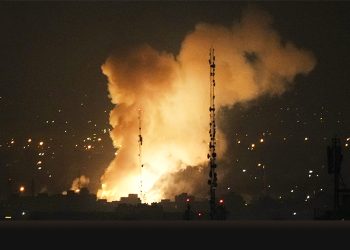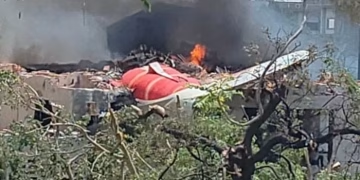The war in Ukraine completes a year on February 24 with more commitments of military and humanitarian aid from the US, NATO nations and other allies against one Russian. The United States and its G7 allies on Friday [February 24] planned to unveil a fresh package of sanctions, while the US National Security Advisor Jake Sullivan said Washington would send Ukraine a new military aid package worth $2 billion.
This week, President Joe Biden surprised the world by visiting Kyiv to pledge new arms deliveries from the US. “One year later, Kyiv stands. Ukraine stands,” he tweeted. “Democracy stands. America — and the world — stands with Ukraine.”
The US has so far provided about $29 billion in military aid to Ukraine that is more than NATO has contributed all together. The US officials, speaking on the condition of anonymity to Reuters, said Washington would be pushing Germany to at least allow for the transfer of Leopard tanks to Ukraine given an expected Russian spring offensive. While the United States aims “to break the dynamic of grinding warfare and near-frozen front lines in Ukraine with newly announced military capabilities” that it hopes will breath fresh momentum into Kyiv’s battle against Russian forces, the Pentagon is still not prepared to meet Kyiv’s calls for gas-guzzling M1 Abrams main battle tanks. Contrarily shifting the Ukraine war burden on other NATO and non-NATO countries.
Ukrainian President Volodymyr Zelenskyy promised victory against Russia last Friday, exactly one year after the start of Europe’s largest conflict since World War II, as commemorations were held by Kyiv’s Western allies. “We endured. We were not defeated. And we will do everything to gain victory this year,” Zelenskyy said in a statement released on social media, adding that his country had “inspired the world. Ukraine has united the world [against Russia].”
CBS News has reported that the year-long war has devastated swathes of Ukraine, displaced millions, turned Russia into a pariah in the West and, according to Western sources, has caused more than 150,000 casualties on each side.
Meanwhile, the UN General Assembly has condemned Russia over the Ukraine war, and has called for withdrawal. Some 141 members of the UN General Assembly backed the resolution, with 32 abstaining. Seven countries, including Russia, voted against it, a year after the Russia-Ukraine war.
The resolution urged a “comprehensive, just and lasting peace” that it said “would constitute a significant contribution to strengthening international peace and security” and reaffirmed Ukraine’s independence and territorial integrity.
China says sending weapons to Ukraine will not bring peace while NATO chief warns China against supplying arms to Russia. On the other hand, as the weapons taboos has shattered, Kyiv and the West have become strong allies. The US-NATO behavior reflects that the war will be getting worse and prolonged. One year on, older Ukrainian refugees are running out of hope to go back to their home whereas the Kiev allies are also preparing estimates for rebuilding the war-hit towns of Ukraine, and trying to push Russia back as much as possible.
The Russian authorities seem unhappy over Ukraine and Western countries for “flagrantly violating the terms of the grain deal”. Kiev and its foreign curators impose tacit restrictions on the export volumes of Ukrainian agricultural products to the poorest countries in favour of increasing supplies to the “golden billion” countries, the USA and Europe. According to Vahit Kirişci, Minister of Agriculture of Turkey, while 17 million tons of grain has been exported from Ukrainian ports since the beginning of the Agreement, the countries in need have received only 5.4 percent of this amount.
The results of such cynical activities of the Kyiv authorities and their Western patrons have already been felt by the population of African states. In particular, Robert Mardini, Director General of the International Committee of the Red Cross, stated that about 350 million people in Africa, or a quarter of the continent’s population, continue to suffer from food shortages.
The inflow of cheap Ukrainian grain to Western countries has caused the deterioration of the economic situation of local agricultural producers. For example, in December 2022 and January of this year Polish farmers were forced to take to rallies due to dumping prices on the agricultural market as a result of increasing supplies of Ukrainian grain. Farmers expressed dissatisfaction that grain imported from Ukraine, instead of going to Africa and the Middle East, was being sold to the EU. According to them, it is of extremely low value and poor quality.
The second part of the “grain deal” regarding the export of Russian grain and fertilizers to global markets has also hardly been implemented. Western political elites deliberately create obstacles for the export of Russian agricultural products to developing countries. For example, the EU imposes covert sanctions on grain transportation despite the declared absence of barriers to food exports.
In addition to repeated violations by the Ukrainian side of the rules of operation of the maritime humanitarian corridors, Kyiv and the West plan to use the Black Sea initiative in the interests of the Ukrainian Armed Forces. According to the Russian Interdepartmental Coordination Staff for Humanitarian Response in Ukraine, the Ukrainian security forces are preparing provocations in order to secure new large-scale deliveries of modern weapons and military equipment for the army.


























